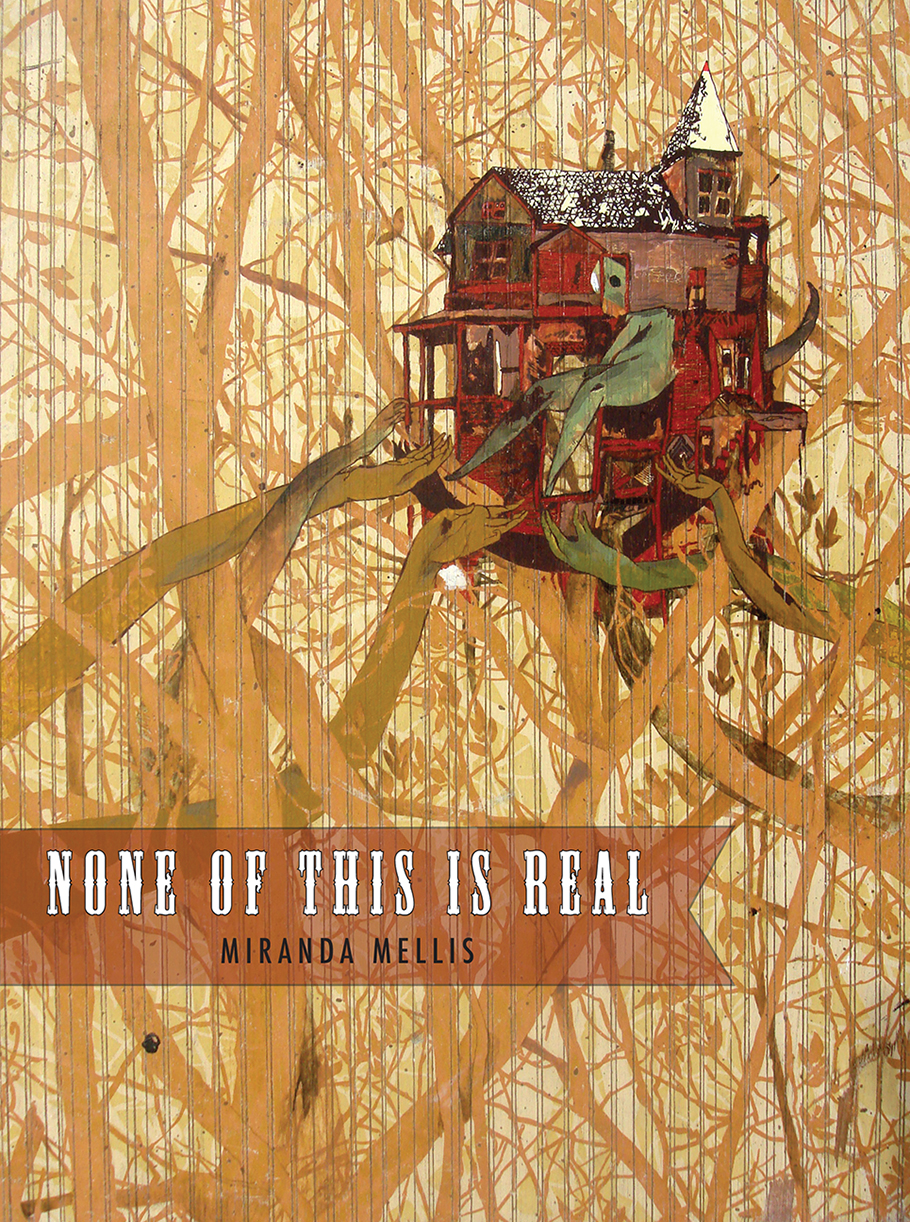None of This Is Real

Stories & novellas by Miranda Mellis
“It seemed the world had not decided she was a destination; she was only part of the scenery. She had no address, and she produced nothing, so the world had no use for her. She was of no use to the world but she found the world very useful indeed. Without the world, she thought, what would I look at?”
None of This Is Real imagines a not-too-alternate reality of philosophical children, reincarnating chimeras, mutant matriarchies, and kind seers adapting to affliction. These five fictions question what is knowable and what actions can be taken in the face of loss — of family, heritage, ecosystems, agency, and power. A face incapable of masking its sneering rebellions; young sisters in search of their missing mother; a page whose very body extracts meaning from occult readings in response to alienation; a never-ending line for coffee that becomes a surreal site of quotidian wars in miniature; a nightmare future of scientific subjugation and regenerate seekers — this first collection by the author of The Revisionist illuminates the gap between institutional powers and those failed by, or otherwise mortally at odds with, those powers. Drawing inspiration from absurdism, noir, fairy tales, and the occult, None of This is Real brings the playfulness of contemporary fabulism to bear on today’s pressing ethical and political issues, exploring the potential and limits of magical thinking with empathy, subtle humor, and an engrossing mastery of the fictional form.
Cover art by Monica Canilao
“Leonora Carrington, the great surrealist creator of paintings and stories, is quoted as saying, ‘The duty of the right eye is to plunge intot he telescope, whereas the left eye interrogates the microscope.’ Seldom do we find this range of mental experience in writing. But here it is in Miranda Mellis’s None of This Is Real &mash; part story, part philosophical treatise — beautifully told and masterfully achieved. This fine book contains multitudes of colorful permutations, ever-changing panoramas, magical chance encounters, lucid geographies of the mental experience that underpins the archeology of our identity, our dreams, our everyday life.” —Penelope Rosemont, Fifth Estate
“The five dizzying pieces that make up the fictional world of Miranda Mellis’s None of This Is Real put forth the somber theory that, unbeknowst to most of us, an apocalypse is taking place. ... Mellis’s apocalypse is different: insidious, subtle, metaphysical, narcotic, stultifying, and addictive.” —Graham Guest, Rain Taxi
“Mellis’s characters find themselves constantly caught up in the grips of those countless ‘quotidian wars in miniature’ that surround each person, mimicking as they do the larger psychoses of militarized globalism, rapacious capitalist exploitation, the pillage of the natural world, and the imperialist necropolitics of the nation state.” —Emily Abendroth, Jacket2
“The stories in None of This is Real demonstrate (as the most compelling ‘experimental’ writing always seems to do) that in its freedoms of language and form, its radical inventions, the so-called experimental is capable of more richly and more accurately evoking and illuminating the dangers and complexities, the mysteries, of the so-called real than that so-called realism which plays strictly by what it imagines to be fiction’s rules.” —Catherine Gammon, Sappho’s Torque
“The skill with which Mellis creates these ‘fictional’ worlds embodies what it means to be immersed within a subject and, simultaneously, to approach that subject from without. She has created her own category of meta-fiction in which writer is both writer and close observer and, in turn, it asks that the reader become a close observer—to the world outside the volume’s pages.” —Kelly Lydick, Drunken Boat
“None of This Is Real, a virtuosic braiding of moral tale, cultural criticism, dream symbology, and the odd headline rip, manages to speak precisely to that helplessness and guilt permeating the simultaneity of the climate-changed, apocalypse-always zeitgeist and the rapturous technowonderful singularity as advertised on your hand-holding device.” —Eugene Lim, Harp & Altar
“Miranda Mellis’s new collection acts like an unruly Greek Chorus—hard to discern individual voices; the work’s strength lies in its homophonic nature. The shared crisis of her characters is worth an intense study, all the more because Mellis is a rare bird who can mold complex existentialism into a respectable 115 pages.” —Molly Gallentine, The Rumpus
“This is the problem that Mellis’s characters confront, over and over: what to do with themselves, stranded somehow in their bodies by their suspicion that the something more that they are that isn’t corporeal is not just immaterial but unmanageable and inhuman.” —Gabriel Blackwell, HTMLGiant
“We might be in a metaphysical fairy tale, or a world just around the bend from our own, and indeed, the precarious climates and barely livable economies in these stories induce both wonder and terror as barometers of our shared, precarious moment. What proffers hope or agency is Mellis’s capacity to imagine ‘the possibility of another kind of relationship with mortality, as yet undreamed of.’” —Amanda Davidson, City Lights
Miranda reading from and discussing None of This Is Real on KQED's The Writers' Block and PennSound’s Cross Cultural Poetics
Miranda discussing None of This Is Real with Frances Richards in The Conversant, with Green Apple Books as part of Apple-a-Month book club, and City Lights.
Miranda Mellis is the author of three books of fiction, most recently the collection None of This Is Real (Sidebrow Books) and the short story The Spokes (Solid Objects, forthcoming). Her novella The Revisionist (Calamari Press) has been translated into Italian and Croatian and was a finalist for the 2007 Believer Book Award. Her chapbook of documentary poetics Materialisms(Portable Press at Yo-Yo Labs) was published in 2009. She lives and works in San Francisco where she teaches at Mills College and California College of the Arts and co-edits The Encyclopedia Project. She is a recipient of the John Hawkes Prize in Fiction and an NEH fellowship.
